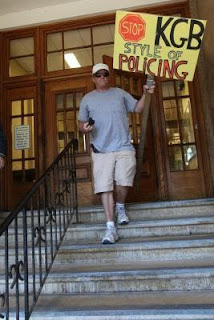A1By HEATHER MCLAUGHLIN
mclaughlin.heather@dailygleaner.com
Blogger Charles LeBlanc was released from custody Friday morning after being charged by the Fredericton Police Force with creating a disturbance on Queen Street

Stephen MacGillivray/The Daily GleanerCharles LeBlanc is seen leaving the provincial courthouse after he was released with conditions Friday. "This is one of the roughest feelings I ever had in my life, the last 48 hours," said a tired-looking LeBlanc as he talked to reporters outside the Queen Street courthouse.
Provincial court Judge Denis Lordon released him on an undertaking to keep the peace, to be of good behaviour and to stop using a bullhorn in the downtown to broadcast his beef with Fredericton police.
LeBlanc is scheduled to appear in provincial court Oct. 28 at 1:30 p.m. for a trial after pleading not guilty to causing a disturbance.
He was arrested by Fredericton police Wednesday for shouting through a bullhorn outside the police station. He's upset with the police because it issued a $140 municipal bylaw ticket to him for riding his bicycle on the sidewalk. The ticket was issued on the basis of a third-party complaint.
LeBlanc said he hopes he can find a lawyer to take his case. Friends of the social assistance recipient are offering to help him, LeBlanc said, but he doesn't want to represent himself in court because of the importance of his case, which he believes is a freedom of speech case.
LeBlanc claimed the ticket was instigated by Dan Bussieres, the sergeant-at-arms of the New Brunswick legislature. LeBlanc has had a running battle with Bussieres because he banned him from the legislature in 2006.
LeBlanc frequently mocks Bussieres on his blog, and he called him his sworn enemy Friday.
"I won't even entertain that question," Bussieres said Friday when asked for a response to LeBlanc's accusations. "So it's a crime to file a complaint against Charles LeBlanc?"
LeBlanc began his protest against the Fredericton Police Force for issuing the ticket because he said the force has a double standard.
He tried to lay a third-party jaywalking complaint by supplying police with video evidence of Speaker Dale Graham and deputy premier Paul Robichaud crossing the street illegally, but the force wouldn't issue them tickets.
"We can't have a two-tiered system, one for the filthy rich and one for the filthy poor. I was forced to protest on the street because they won't listen," he said.
LeBlanc claims the Fredericton Police Force is out to get him since he recorded video footage of Fredericton police officers using force to arrest a Quebec soldier in the Tannery bar district. An officer was found not guilty after trial of using excessive force.
LeBlanc is also upset about how he was treated in jail because he was refused access to his own medications.
"When you're in jail, you don't really know what's going on in the outside world. I have ADHD and I'm on medication at night to sleep, and the medical staff at the Saint John regional correction denied me from having my prescription and from having my inhaler.
"They said use another inhaler. I was in pain. I didn't sleep good ... I only slept about six hours the last 48. It wasn't good, and there will have to be an investigation."
LeBlanc said when he's rested, he will seek a meeting with provincial Health Minister Madeleine Dube to demand an investigation into the actions of medical staff at the Saint John Regional Correctional Centre.
LeBlanc said he would have preferred not to have to sign an undertaking that he wouldn't use a bullhorn in the downtown area, but he feared spending more time in jail.
"The last time I was in jail was in Phoenix, Ariz., in 1978, and I think it was better in Phoenix (than) in Saint John. I'm a strong supporter of freedom of speech, but when you're told if you don't sign these papers you can be remanded in custody for another month, moi, with no medication, I would have died," he said.
"It's a scary, scary case because it could set a precedent across Canada. If I represent myself, I might blow this case."
LeBlanc has had skirmishes with police in the past. In 2006, he was arrested when he blogged at a demonstration at the Atlantica business conference in Saint John. He was acquitted of the charge.
LeBlanc also shows up frequently at public events in Fredericton, at city council and does street interviews with local politicians.
About 20 of his friends attended his Friday court appearance.